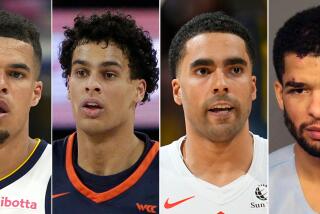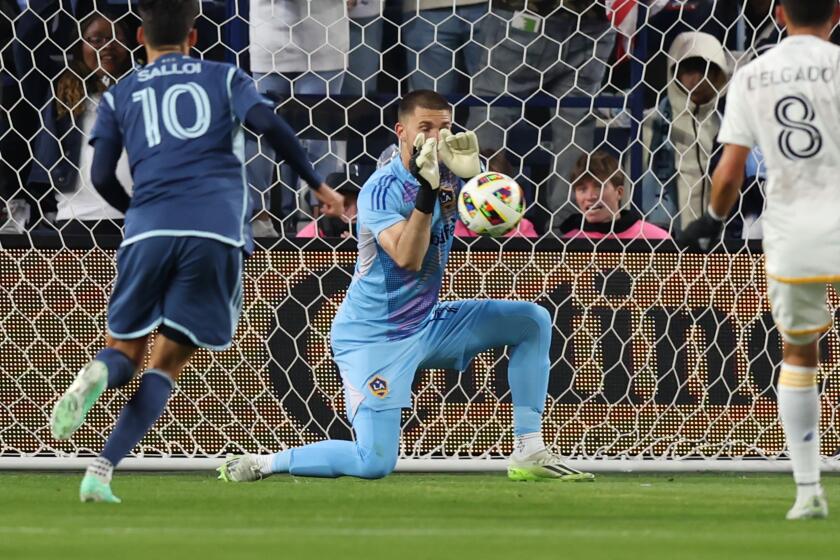Daugherty Has Found Life of NBA Pivotman Harder Than Expected
Brad Daugherty figured he had experienced his major growth spurt in eighth grade. He was wrong.
In the year before he enrolled at Charles D. Owen high school in Black Mountain, N.C., Daugherty went from being a skinny 6-foot-3 to a gangly 6-foot-10. He added another two inches to that height by the time he graduated from the University of North Carolina last year.
Yet, being a 7-footer in the NBA is as unusual as having brown eyes and the cerebral Daugherty did not fully grasp the fact. When the Cleveland Cavaliers made him the top overall pick in the draft last summer, he reacted with cautious optimism.
“Even though I’m not as beefy as a lot of centers, I thought my adjustment to the NBA would be more or less predictable,” he says. “In retrospect, it has been anything but that. I had, and still have, a lot to learn.”
Daugherty was inconsistent early in the season as the youthful Cavaliers struggled. A member of the rookie trio that includes shooting guard Ron Harper and power forward John (Hot Rod) Williams, the 245-pound Daugherty found himself being shoved around by the league’s more experienced giants.
“I realize I had pretty much been given a reputation as a cerebral rather than physical player,” he says. “I knew things would be different, but the intensity has surprised me.”
Daugherty’s most obvious weakness centered on a typical rookie problem--fouls. Often, he was saddled with three fouls by halftime and the fourth invariably came early in the third quarter and understandably limited his effectiveness.
Cleveland Coach Lenny Wilkens, himself a veteran of 15 NBA seasons, protested the treatment his tallest rookie was enduring yet understood the situation.
“Rookies always get called for more fouls and the top overall pick is likely to be watched very closely,” he says. “But the reason Brad heard and still hears the whistle so much is that he reacted to being pushed by pushing back too obviously.”
Daugherty has increased his upper body strength and has blended physical play into his game rather than just trading elbows.
Through 72 games, he has kept his averages hovering at 15 points and eight rebounds. Daugherty has led Cleveland in rebounds 26 times, in scoring 11 times and in assists 10 times.
That last statistic has surprised many NBA observers, but not Daugherty. Although he averaged less than two assists throughout his days with the Tar Heels, He now finds teammates at the rate of 3.5 feeds per game and leads all NBA centers in this category.
Daugherty says this versatility is “necessary for survival.”
“After the first month, I knew I had to fight fire with fire,” he says. “I mean, you can’t stop playing and ask the Robert Parishes to quit playing well.
“If you’re being outshot, try and rebound more. If you’re being outpounded on the board, try and pass to your teammates.”
Theory has not been so easy to put into practice. The Cavaliers average close to 20 turnovers, but the rest of the league has more than noticed the gradual improvement in Daugherty and his teammates.
In a 116-113 victory over Milwaukee at the Richfield Coliseum on Mar. 27, Daugherty scored 27 points with 12 rebounds and nine assists.
“Brad Daugherty came into this season with a lot of pressure on him and has begun to respond to the challenge,” said Buck Coach Don Nelson. “The best thing about him is that he’s more adaptable than the average rookie. Each time we play him, he’s matured.”
Daugherty remains his own worst critic.
“I always think I could’ve played better,” he says. “My teammates and myself want to learn and play better. To grow, because in the long run we will win games. I’m sure of that.”
More to Read
Get our high school sports newsletter
Prep Rally is devoted to the SoCal high school sports experience, bringing you scores, stories and a behind-the-scenes look at what makes prep sports so popular.
You may occasionally receive promotional content from the Los Angeles Times.






